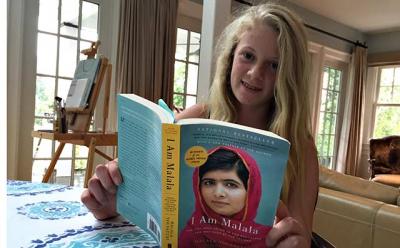Summer Reading Gets Serious

The East Hampton School District is hoping its latest homework assignment will take the concept of summer reading to the next level.
The entire student body of the East Hampton Middle School has been asked to read the poem “When I Heard the Learn’d Astronomer” by Walt Whitman, and all of the high school students, including the incoming ninth graders from other school districts, are being asked to read the book “I Am Malala” by Malala Yousafzai. Their parents, teachers, administrators, and even school board members are also being asked to read these two works.
“It’s a chance for the community, when you do this kind of reading, to come together and ask questions around a common text,” Charles Soriano, the middle school principal, said. “Your experiences are what drive your perceptions about the piece. All of us have unique experiences in life and we bring that to bear in the reading.”
Last year, with the theme “we are our choices,” the entire middle school was asked to read the Robert Frost poem “The Road Not Taken.” This year’s theme is “knowledge is power,” and it will be incorporated into lessons and projects throughout the school year, not just in English classes but also in subjects like social studies, science, math, and art. Reading that common text, Mr. Soriano said, is a way to promote interdisciplinary learning.
In a June 4 email to parents detailing the summer reading project, Mr. Soriano offered sample questions to think about when reading “When I Heard the Learn’d Astronomer,” including “What is knowledge? How do you ‘know’ something? How does knowledge empower us? How does it help us to make decisions?”
The poem is available for free online at poetryfoundation.org.
Similarly, East Hampton High School has made “I Am Malala” available for free on its website in both English and Spanish. The book details the struggles of its young author, who fought for the rights of girls to have access to education in her home in Pakistan’s Swat Valley, which came to be occupied by the Taliban. Taliban fighters attacked Malala with gunfire on a school bus, but she survived and went on to be awarded the Nobel Peace Prize at the age of 16.
In an email, Adam Fine, the high school principal, told parents, “The idea behind a shared summer reading is not only to foster a love of reading, but also to foster a greater sense of academic community through mutual experiences and discussions surrounding a text. We at E.H.H.S. hope to create a greater sense of academic community, as well as to set an appropriate ‘academic’ tone for our students, as we encourage everyone to share in this common reading experience.”
Mr. Fine later said the book was chosen because he believed Malala’s advocacy for education for women is very important. “Especially because we are raising standards and expectations across the board,” he said.
As of Tuesday afternoon, BookHampton in East Hampton was sold out of the full version of “I Am Malala,” with only a handful of copies of the abridged version left.
“It’s been a best seller for us since it came out in hardcover. Everybody is inspired and charmed by Malala,” said Kim Lombardini, the store’s social media manager.
Ms. Lombardini, who has read the book, said it is an important work that both inspires kids to do great things and underscores things that children in this area may take for granted, such as quality education. “Anything that makes kids stop and appreciate what they have creates better adults,” she said.
Also as of Tuesday afternoon, Annelise Mendelman, a 14-year-old ninth grader who graduated from the Springs School as valedictorian in June, was on page 138 of “I Am Malala.”
The book, which is divided into three sections, was a little slow at first but definitely interesting, Annelise said. The pace has picked up now that she is into the second part, which details the arrival of the Taliban in Malala’s hometown. Annelise said she is reading the full text rather than the modified version that has been suggested for younger readers.
“It’s a good book,” she said. “I can understand why they picked it. It has good lessons on why education is important.”
Annelise compared it to the 1958 book “Night” by Elie Wiesel, a Holocaust survivor who also received a Nobel Peace Prize. In it, Mr. Wiesel tells of his experiences as a teenager in concentration camps in Germany and Poland during World War II. “I Am Malala” is also difficult material, Annelise said.
“I feel like it will be valuable,” she said. “You can talk to people about it and share your opinions.”
